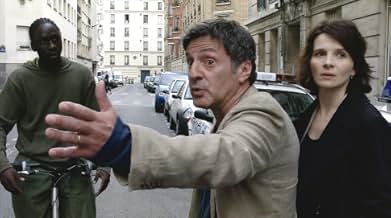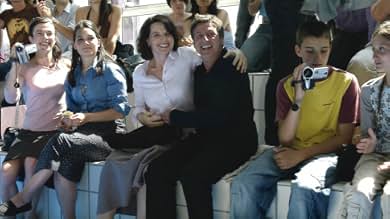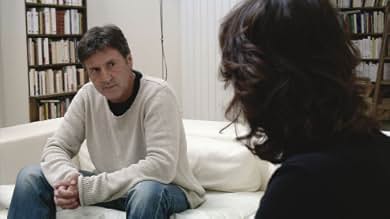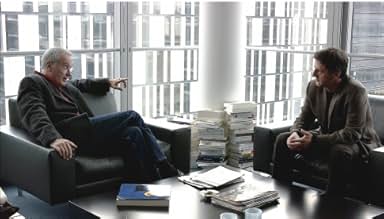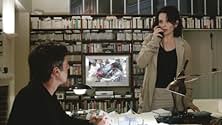Una coppia di sposi è terrorizzata da una serie di videocassette di sorveglianza lasciate sul loro portico.Una coppia di sposi è terrorizzata da una serie di videocassette di sorveglianza lasciate sul loro portico.Una coppia di sposi è terrorizzata da una serie di videocassette di sorveglianza lasciate sul loro portico.
- Premi
- 29 vittorie e 37 candidature totali
Recensioni in evidenza
We are, yes, we're the ones who look without really seeing and Michael Heneke, the veteran young director knows it. Paranoia and responsibility in a film that is as irritating as it is brilliant. Even the opening credits, small writing while a camera, still, very still, stares at an upper, middle class abode. An intellectual Hitchcockian exercise by a genial director who seems, at times, is playing with himself. He probably is doing it knowing that we're looking and tests our endurance without caring, really, whether we're with him or against him. What he, I believe, wouldn't tolerate is our indifference but, there is no danger of that. Love and hate. Admiration and ridicule. He will inspire all of that, at the same time by some of us, all of us, one way or another. The performances are all wonderful and there is a marvelous moment with the great Annie Girardot.
"Caché (Hidden)" uses the visual power of film to create an escalating examination of contemporary paranoia and personal global responsibility the way Francis Ford Coppola's 1974 film "The Conversation" did with sound and fictional criminals.
Writer/director Michael Haneke plays visual tricks on the audience as voyeurs from the opening shot, much as he did with "Code Inconnu," as he coyly plays with technology, building on the pervasive surveillance potential of our times.
The comfortable upper middle class life of married intellectuals Daniel Auteuil and Juliette Binoche is more and more disrupted by spooky video and drawings from some kind of stalker. With a bit heavy-handed constant background TV news coverage about terrorism and other violence in the MidEast, as well as too much irony that Auteuil works on TV (evidently in yet another book discussion show like the central narcissist in "Look At Me (Comme une image)"), race is quickly introduced as a flash point in contemporary Paris from a brief street confrontation and reinforced with Auteuil's flashback dreams of his youth.
While the political angles are obvious, the Hitchcockian tension is very effectively built up (though not narratively resolved even as some secrets are revealed that lead to other inscrutabilities), not just as we see Auteuil repeatedly lie and Binoche practically disintegrate from nerves, but through sudden violence.
While we never understand who all is lying and who isn't, the film further plays on the truth that visual images don't in fact communicate the reality of a situation and can be misleading about relationships, particularly once paranoia has destroyed trust. The film also raises the question if people change their behavior if they know they are being watched and that you can't really hide from your past. Cynically, but perhaps honestly as opposed to in "Crash," here there is no easy resolution of acceptance of guilt and responsibility in personal lives any more than there is in the legacy of colonialism and racism.
Not only is the past never dead, but the film keeps repeating issues of not just am I my brother's keeper, but the sins of the father are revisited on the sons, such that it's important to keep watching even as the credits start to appear at the end (there was much shouting when some folks got up to leave too soon, blocking cryptic clues to those behind them).
The subtitles are very poorly done, with many scenes having them white on white, instead of the much easier to read yellow.
Writer/director Michael Haneke plays visual tricks on the audience as voyeurs from the opening shot, much as he did with "Code Inconnu," as he coyly plays with technology, building on the pervasive surveillance potential of our times.
The comfortable upper middle class life of married intellectuals Daniel Auteuil and Juliette Binoche is more and more disrupted by spooky video and drawings from some kind of stalker. With a bit heavy-handed constant background TV news coverage about terrorism and other violence in the MidEast, as well as too much irony that Auteuil works on TV (evidently in yet another book discussion show like the central narcissist in "Look At Me (Comme une image)"), race is quickly introduced as a flash point in contemporary Paris from a brief street confrontation and reinforced with Auteuil's flashback dreams of his youth.
While the political angles are obvious, the Hitchcockian tension is very effectively built up (though not narratively resolved even as some secrets are revealed that lead to other inscrutabilities), not just as we see Auteuil repeatedly lie and Binoche practically disintegrate from nerves, but through sudden violence.
While we never understand who all is lying and who isn't, the film further plays on the truth that visual images don't in fact communicate the reality of a situation and can be misleading about relationships, particularly once paranoia has destroyed trust. The film also raises the question if people change their behavior if they know they are being watched and that you can't really hide from your past. Cynically, but perhaps honestly as opposed to in "Crash," here there is no easy resolution of acceptance of guilt and responsibility in personal lives any more than there is in the legacy of colonialism and racism.
Not only is the past never dead, but the film keeps repeating issues of not just am I my brother's keeper, but the sins of the father are revisited on the sons, such that it's important to keep watching even as the credits start to appear at the end (there was much shouting when some folks got up to leave too soon, blocking cryptic clues to those behind them).
The subtitles are very poorly done, with many scenes having them white on white, instead of the much easier to read yellow.
This was a very good film, an excellent study in psychological tension. Unfortunately, I don't think a lot of Americans or really anyone who isn't very familiar with the French-Algerian war will be able to understand it. It's about the horrors of that war and the French denial of their part in it -- very much tying in to the French youth race riots we saw last year. It also quietly draws some parallels with the war in Iraq. The ending was perhaps much too subtle. Everyone around me as we left the theater here in Los Angeles was expressing confusion. This was an older, more sophisticated audience, too. I don't think they really understood what was happening all along.
That said, it was still fantastic. I'm glad that at least outside of the U.S. it's gotten the recognition it deserves.
That said, it was still fantastic. I'm glad that at least outside of the U.S. it's gotten the recognition it deserves.
If you've just seen "Cachê" and are still (understandably) in shock, not knowing whether you really liked it or not, let me ask you a few questions. Now, when was the last time a film:
a) had you glued to your seat as in "Caché", your eyes and neurones required to work in full gear from beginning to end, making it impossible to erase it out of your mind (instead of the instantly forgettable films you see every week), and actually making a second viewing almost compulsory?
b) posed such complex, multi-layered questions -- socio-political ones (the shameful, violent legacy of past and present imperialist nations, the manipulation of "reality" by the State and the media), existential ones (the racial, class and social prejudices that we all carry and have to fight within ourselves), and more prosaic ones, like trying to solve a complicated thriller? When were they so masterly interwoven?
c) made you aware that your explanation for the movie's most immediate, "practical" question (who's sending the tapes to Georges) will be influenced by your own background and prejudices?
d) had such a controversial and rich ending? (I could think of at least five possible denouements, even considering that I DID see the two boys -- q.v. the multiple theories about the ending in "Caché"'s message boards here in IMDb).
"Caché" is one of the few real masterpieces of the 2000s. The mix of socio-political comment with the thriller genre is not new, of course (you can go back at least to great German silent films by Lang, Murnau, Dieterle, Pabst). In 2005 alone, Cronenberg made the half-successful "A History of Violence", Spielberg the underachieved "Munich", Stephen Gaghan the overwrought "Syriana", Paul Haggis the soap-operatic "Crash". But Haneke asks us and gives us much more: he demands our ability to fill in the many important historical and political gaps, messes with our prejudices but respects our intelligence, and knows that a good part of us viewers are bored to death of being spoon-fed with one-digit I.Q. plots in mechanical thrillers inhabited by tired, phony "archetypes" of good x evil characters.
"Caché" is a monumental proof of Haneke's COMPLETE command of his craft. Artistic achievements like this are now SO rare in films that "Caché" feels like a happening -- a work of art that is mind-boggling, hypnotic and physically unnerving, ethically and esthetically disturbing, combining the sense of revelation and discomfort you get with the best political films with the braincells workout you get with the best thrillers.
As I left the theater, three masterpieces immediately came to my mind: Clouzot's "Le Corbeau" (a political statement disguised as a thriller and a probable inspiration for "Caché"), Antonioni's "The Passenger" (ditto, and also for the long, breathtaking, "open-meaning" last shot) and Resnais' "Marienbad" (the seminal film of multi-layered possible interpretations of "reality"). "Caché" stands tall on its own, reaffirming Haneke as one the top-5 working directors of the 2000s. Can't wait for his next film -- but while I do, I'll watch "Caché" one more time, and understand that hiding (Georges hiding his past and his feelings, nations hiding shameful parts of their history, Haneke hiding evidence, explanations and conclusions) can be a form of powerful revelation...and self-revelation.
a) had you glued to your seat as in "Caché", your eyes and neurones required to work in full gear from beginning to end, making it impossible to erase it out of your mind (instead of the instantly forgettable films you see every week), and actually making a second viewing almost compulsory?
b) posed such complex, multi-layered questions -- socio-political ones (the shameful, violent legacy of past and present imperialist nations, the manipulation of "reality" by the State and the media), existential ones (the racial, class and social prejudices that we all carry and have to fight within ourselves), and more prosaic ones, like trying to solve a complicated thriller? When were they so masterly interwoven?
c) made you aware that your explanation for the movie's most immediate, "practical" question (who's sending the tapes to Georges) will be influenced by your own background and prejudices?
d) had such a controversial and rich ending? (I could think of at least five possible denouements, even considering that I DID see the two boys -- q.v. the multiple theories about the ending in "Caché"'s message boards here in IMDb).
"Caché" is one of the few real masterpieces of the 2000s. The mix of socio-political comment with the thriller genre is not new, of course (you can go back at least to great German silent films by Lang, Murnau, Dieterle, Pabst). In 2005 alone, Cronenberg made the half-successful "A History of Violence", Spielberg the underachieved "Munich", Stephen Gaghan the overwrought "Syriana", Paul Haggis the soap-operatic "Crash". But Haneke asks us and gives us much more: he demands our ability to fill in the many important historical and political gaps, messes with our prejudices but respects our intelligence, and knows that a good part of us viewers are bored to death of being spoon-fed with one-digit I.Q. plots in mechanical thrillers inhabited by tired, phony "archetypes" of good x evil characters.
"Caché" is a monumental proof of Haneke's COMPLETE command of his craft. Artistic achievements like this are now SO rare in films that "Caché" feels like a happening -- a work of art that is mind-boggling, hypnotic and physically unnerving, ethically and esthetically disturbing, combining the sense of revelation and discomfort you get with the best political films with the braincells workout you get with the best thrillers.
As I left the theater, three masterpieces immediately came to my mind: Clouzot's "Le Corbeau" (a political statement disguised as a thriller and a probable inspiration for "Caché"), Antonioni's "The Passenger" (ditto, and also for the long, breathtaking, "open-meaning" last shot) and Resnais' "Marienbad" (the seminal film of multi-layered possible interpretations of "reality"). "Caché" stands tall on its own, reaffirming Haneke as one the top-5 working directors of the 2000s. Can't wait for his next film -- but while I do, I'll watch "Caché" one more time, and understand that hiding (Georges hiding his past and his feelings, nations hiding shameful parts of their history, Haneke hiding evidence, explanations and conclusions) can be a form of powerful revelation...and self-revelation.
Michael Haneke's film begins as a clinical, psychological and social study of a respectable individual in European society. It ends as a study of a larger contemporary European segment of its population. It reminds one of the early works of Fassbinderonly Haneke's production values are more sophisticated. The camera becomes a charactera major one at that. This reminds the viewer that he is watching cinema at several junctures and that s/he is part of the communication/entertainment process. It makes you constantly ponder if the cinema you are watching is providing truth or lies (or something in between) 24 frames per second. The fixed-medium range shots that opens and closes the film indicate the view and mood of the director--clinical, somewhat distanced and unshaken by the story he unfolds. We also notice that what we are seeing, might not be what we think we are seeing. Antonioni did this to us in "Blow up" several decades ago.
After the screening at the on-going Dubai film festival, I was amused at the director carefully distancing himself from a situation where he could have resolved the issues-he prefers to leave it to the viewer to do so. In a way the entertainment continues after the screening if you choose to reflect on what you saw.
At the obvious level, it is a study of colonial guilt of Europe and race relations. At a deeper level, it probes complacency and bourgeois temperaments of the financially secure classes in society. Escape from reality comes from closing curtains, shutting off the outside world and consuming sleeping tablets. At another level, the film explores the attitudes of three distinct generations towards social relationships.
Haneke uses graphic shocking violent scenes to jolt the audiences when they least expect it. He seems to enjoy the process. His strength is not in his cinema (Kubrick, in comparison, was brilliant at this game). Hanneke's strength lies elsewhereeliciting fascinating performances from his cast. Daniel Auteuil, Julliette Binoche, Maurice Benichou and Annie Girardot were simply fascinating to watch.
The strength of the film lies in the subject that will disturb anyone. Many of us have something in our past that we wish to hide or not discuss. Yet there is a conscience in us that nags us to believe that there was a witness to that wrongdoing--a witness who cannot be buttonholed. It is this psychological fact that makes the film tick, much less its cinematic flourish.
After the screening at the on-going Dubai film festival, I was amused at the director carefully distancing himself from a situation where he could have resolved the issues-he prefers to leave it to the viewer to do so. In a way the entertainment continues after the screening if you choose to reflect on what you saw.
At the obvious level, it is a study of colonial guilt of Europe and race relations. At a deeper level, it probes complacency and bourgeois temperaments of the financially secure classes in society. Escape from reality comes from closing curtains, shutting off the outside world and consuming sleeping tablets. At another level, the film explores the attitudes of three distinct generations towards social relationships.
Haneke uses graphic shocking violent scenes to jolt the audiences when they least expect it. He seems to enjoy the process. His strength is not in his cinema (Kubrick, in comparison, was brilliant at this game). Hanneke's strength lies elsewhereeliciting fascinating performances from his cast. Daniel Auteuil, Julliette Binoche, Maurice Benichou and Annie Girardot were simply fascinating to watch.
The strength of the film lies in the subject that will disturb anyone. Many of us have something in our past that we wish to hide or not discuss. Yet there is a conscience in us that nags us to believe that there was a witness to that wrongdoing--a witness who cannot be buttonholed. It is this psychological fact that makes the film tick, much less its cinematic flourish.
Lo sapevi?
- QuizThere is no music, save for the theme on George's show, and background music at Anne's publishing party.
- BlooperDuring the tape where Georges pulls up in his car and parks at night the headlights clearly cast a huge distinct shadow of the camera on the wall.
- Citazioni
Georges Laurent: Isn't it lonely, if you can't go out?
Georges's Mom: Why? Are you less lonely because you can sit in the garden? Do you feel less lonely in the metro than at home? Well then! Anyway, I have my family friend... with remote control. Whenever they annoy me, I just shut them up.
- Curiosità sui creditiThe opening credits appear over a shot of the husband and wife's house, but they appear one by one and in rows. By the time the credits are over they are all shown together, much like they would on a poster or in the credits section of a movie trailer.
- ConnessioniFeatured in Smagsdommerne: Episodio #3.13 (2006)
I più visti
Accedi per valutare e creare un elenco di titoli salvati per ottenere consigli personalizzati
- How long is Caché?Powered by Alexa
Dettagli
- Data di uscita
- Paesi di origine
- Sito ufficiale
- Lingua
- Celebre anche come
- Caché
- Luoghi delle riprese
- 49 Rue Brillat-Savarin, Paris 13, Parigi, Francia(Georges' house)
- Aziende produttrici
- Vedi altri crediti dell’azienda su IMDbPro
Botteghino
- Budget
- 8.000.000 € (previsto)
- Lordo Stati Uniti e Canada
- 3.647.381 USD
- Fine settimana di apertura Stati Uniti e Canada
- 57.010 USD
- 25 dic 2005
- Lordo in tutto il mondo
- 16.197.824 USD
- Tempo di esecuzione
- 1h 57min(117 min)
- Colore
- Mix di suoni
- Proporzioni
- 1.78 : 1
Contribuisci a questa pagina
Suggerisci una modifica o aggiungi i contenuti mancanti

